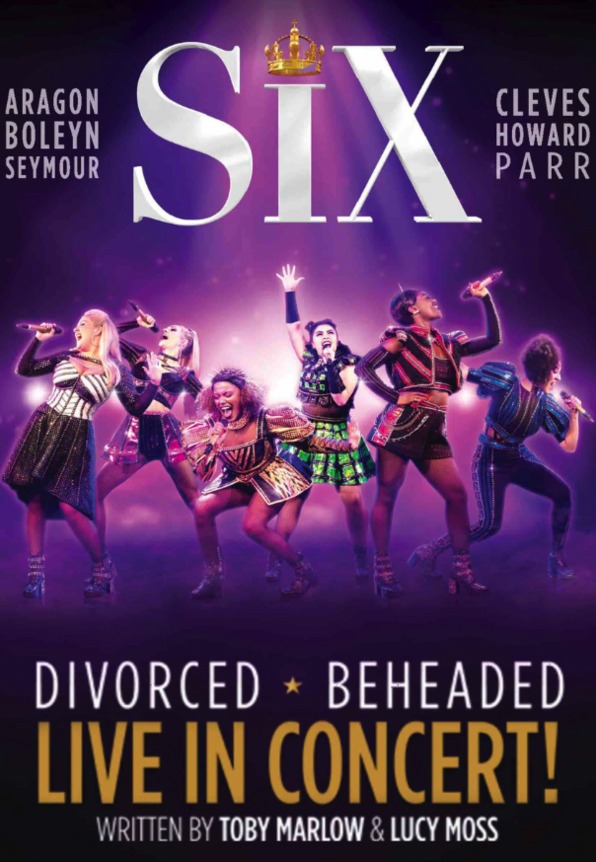
Every few decades, a musical rises to become a cultural sensation. After its international success, Six the Musical opened its first-ever tour in Korea on March 10, which will continue with a Korean cast from the end of March to the end of June. The question is, does Six The Musical shine as the new Hamilton, or will it stand capped at being a half-aware ‘girlypop’ concert?
Most people have heard of King Henry VIII. Not because of what he wrote in the constitution or accomplished in a war, but because of his six wives and his disposition for beheading them. “Divorced. Beheaded. Died. Divorced. Beheaded. Survived.” These six words open the show in a powerful eerie tone that hints at Chicago’s “Cell Block Tango”. Each word represents, in order, the six wives of Henry VIII and the fate for which they were remembered.
Six the Musical is glitter, queen-energy, and Gen Z humor condensed into a short 80-minute run time. The musical takes a different approach to this popular history, taking the six wives and recasting them into modern pop stars with the aim of providing a perspective on them separate from that of their status or the degrading rumors about them. Each of the ex-wives pays homage to a couple of modern “Queenspirations”, also known as pop singers; for example, Catherine of Aragon to Beyonce and Shakira, Anne Boleyn to Lily Allen and Avril Lavigne, and Anna of Cleaves to Nicki Minaj and Rihanna. By experimenting with a unique genre of its own — electronic, hip-hop, soul, house, and underlying it all, pop — Six strays away from the “traditional” musical and embraces an energetic and camp “in consort”, where the goal is to embrace the silliness and to be more lighthearted in its implications.
As all were traumatically abused by the late King, the six wives gather to compete to see which of them has had the worst life (a strange contest to want to win), where the winner will become the lead singer of their band. The tables turn when Catherine Parr sings “I Don’t Need Your Love”, revealing to the queens how self-degrading the competition was, and that they should instead work together to rewrite their history.
Six thus is a celebration of sisterhood, upon which it draws attention to the patriarchal basis in which history was written and reclaims the six wives’ stories into something much more than “divorced, beheaded, died”. The plot also touches on the tendency for modern patriarchal structures that encourage women to compete against each other, when in reality there is a choice for women to work together. As the repeated quip cleverly explains, “HIS-tory” is reconstructed to “HER-story”. The feminist message is reinforced by the all-women cast and crew, including the writers, director, as well as all of the band members.
However, the nature of the short run time, humor-based script, and cheery genre make the discussion on feminist reclaiming of history rather shallow and contradictory. The historical accuracy is off at times to prioritize dramatization, and the plot drops its entire contest framework abruptly to narrowly avoid failing the Bechdel test. Some horrible events experienced by the queens (such as death during childbirth, sexual assault, and miscarriages) are heavily underplayed for comedic effect, which arguably goes against the message of the musical. Moreover, dialogue is such a small part of this music-heavy show that most of it portrays the queens as one-dimensional, overly gossipy, and savage at times, which again goes against the aim of elevating these queens above these qualities. In light of the underdevelopment of the characters, the queens come off more like feminist caricatures than feminist legends.
The show does accomplish, nevertheless, a space in which we can accessibly talk about women, abuse, and power in a digestible manner. We must remember that some works’ purpose is simply to spark a conversation. Further, in fairness, oversimplification in exchange for dramatism is not just a problem in Six the Musical, but in commercial theater in general. Perhaps there would be room for more criticism if the writers of the musical are unaware of the shallowness and intended for it to be a masterpiece in feminism. It is quite the opposite though, as writers Lucy Moss and Toby Marlow state that “it was more reflective of their own individual journeys [in 2017 as college students] discovering the discourse surrounding gender,” and knowing what they know now, “[they] would make it less terrifyingly binary.”
It is undeniable that a forced anachronism of merging 16th-century marital politics with 21st-century humor seems messy. Yet the writers of Six the Musical somehow make it mesh to make perfect sense. And with the powerhouse performers backing up the Tony Award-winning score, Six is no Hamilton — but something entirely astonishing on its own.

